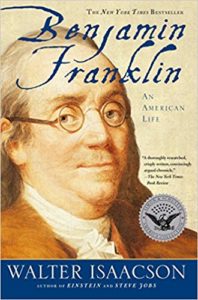
Reading Walter Isaacson’s biography was insightful into one of the most famous Founding Fathers, but one who is probably lesser known for his intellect. Isaacson brings the human being to the forefront of this almost mythical figure. Franklin was the only Founding Father to sign all four major American Revolution documents; the Declaration of Independence, Treaty with France, Peace Accord with Great Britain, and the United States Constitution. In later life he was President of the Pennsylvania Society for Promoting the Abolition of Slavery.
Where would the United States be today had Benjamin Franklin not shared his wisdom throughout most of the 18th century? Yes, we know he fiddled with a kite and skeleton key to discover electricity. He started the first free public library on this continent. He organized fire brigades and formed militias to maintain order in cities. He developed bifocals, something most of us use today. He created a smokeless wood stove that cleared the air for healthy breathing.
But those characteristics are not what made Franklin a true American hero. Born in Boston to a lowly shopkeeper and his wife, Benjamin ran away from home and ended up in Philadelphia while still a teenager. He studied printing from an older brother, working in print shops before opening his own. Owning his own shop allowed his to share his thoughts and expose new ideas in a particular way. He wrote parodies to slyly expose his beliefs. Once read, the audience thoughtfully recognized the true meaning of his work. He organized clubs to promote conversation and understanding among citizens.
Franklin’s first encounter with politics occurred in Philadelphia where he clashed with the Penn family, the Proprietors of the Colony of Philadelphia. Most of the colonies were Royal Colonies, meaning they answered to the King of England. But Proprietors had more leeway, answering only to Parliament.
About the same time Franklin was named Post Master of all the colonies. He traveled from Connecticut to South Carolina while carrying out his duties. From these travels Franklin learned first hand about life throughout the British Colonies. Along the way he urged the colonies to join together for their common good as early as the early 1850s.
In 1857 Benjamin Franklin began a new service, that of political service. He was not a political genius, neither was he extremely well learned in religion or science, but his practical interest in these areas allowed him to mingle with rich and poor alike. Kings and leather apron manual laborers alike felt an affinity for Benjamin Franklin. Yet, Franklin often wore a fur cap to show he lacked elitism. Never did he own a powdered wig, the sign of a true gentleman.
Franklin represented the Colonies in England and France to achieve treaties and peace accords. Always fighting arbitrary authority in a peaceful manner, he stood for merit, virtue and hard work. Yet, he was pragmatic, often showing willingness to compromise after pushing his ideas to great limits. Such was the case at the Constitution Convention in the summer of 1787. Delegates differed on the form of representation. After strongly supporting a unicameral delegation, Franklin realized the need of smaller states to have equal representation. At that point he suggested two legislative groups, one with equal representation and the other with representation based on population. Without this compromise, the United States might have been a pipe dream.
On his death the French statesman Anne-Robert-Jacques Turgot wrote, “He snatched lightning from the sky and scepter from tyrants.” For much more about this American hero read Benjamin Franklin: An American Life by Walter Isaacson.
